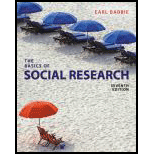
Introduction
In order to answer this question, units of analysis would include words used and books cited by members of each party. Sampling methods would include reading transcripts of congressional hearings, speeches given, and press conference transcripts. Relevant measurements include the content of communications as well as types of bills sponsored and voting patterns on relevant bills.
Explanation of Solution
Answer and explanation
(This question calls for a subjective answer. This is an example of an appropriate response.)
In order to determine whether Republicans or Democrats offer more support for free speech, units of analysis, sampling methods, and relevant measurements must be taken into account. The books cited by politicians from each side and the words they use when communicating are units of analysis for this question. If one side cites more books that indicate that free speech is valuable, such as Fahrenheit 451, this may be one data point to use in answering the question. Sampling methods to get units for analysis would include examining transcripts from congressional hearings, in which members from each party will have asked questions and made statements to analyze. Another method would be analyzing speeches given by members of each party, and transcripts of appearances on press related television shows. Relevant measurements include the content of the aforementioned communications, as well as the types of bills sponsored, and voting records on bills related to free speech issues.
Want to see more full solutions like this?
Chapter 11 Solutions
The Basics of Social Research (MindTap Course List)
- Simple/ humanized answers: How has the field of education for students with visual impairments (low vision and blindness) evolved? What is the definition of “visual impairment,” how are students identified, and what are the typical causes of visual impairments? Why is early intervention so critical for children with visual impairments, and how can families support children with visual impairments? What are some specific concerns for culturally and/or linguistically diverse children with visual impairments? What kinds of educational responses are needed to address the needs of students with visual impairments?arrow_forwardWould elections have more third-party success if the US had ranked-choice voting nationwide?arrow_forwardAnswer grammararrow_forward
- Would elections have more third-party success if we had ranked-choice voting nationwide?arrow_forwardHow do minor parties influence the U.S. electoral system?arrow_forwardeelancer X English task 1.pdf - Google Driv X kq_A8Yyhcg5Muq83vtY5jmlvjd6ITE/view + Open with Google Docs Task Requirements: Word Count: 300-400 Formatting Style: MLA (for more information click here) *** A minimum of 1 reliable source must be used! Any sources must be properly cited according to the formatting style assigned Many people disagree about the appropriate age to allow children and young adults to use social media. Write an essay that argues your viewpoint about the issue. Develop your claim with reasons and evidence, and form a rebuttal to argue against a counterclaim. Page 1 / 1 Q + 26°C Mcarrow_forward
- DCS cans certification exam answers micaharrow_forwardDescribe a business that has used backcasting or scenarios to assess a situation and then developed a strategy to achieve their goals? what are the obstacles they faced ?arrow_forwardWhy could Backcasting be considered the most useful futuring method? how does the use of modules and simulations relate to futuring? is this method effective?arrow_forward
- "Literature is able to challenge perceptions by capturing the voices of frequently silenced characters". In the light of this comment show how Alexander Masters is successful in promoting Stuart's voice in Stuart: Alfie backwards. Include any quotes which are relevant.arrow_forwardBased on the Practical Foresight GuideLinks to an external site.: select ONE of the futuring methods from the guide and apply it to the Partners in Care problem. PROBLEM to SOLVE from Partners in Care: Increase number of face-to-face/in-person volunteers! As a growing nonprofit, Partners in Care increased the number of virtual volunteers during the pandemic. However, they need more face-to-face (in person) volunteers to help with driving clients to appointments and handyman work. Along with these solutions, they would love to have creative ways to recruit young volunteers to support social media and communication needs. short-term (within the next 3 months) long-term (within the next 2 years)arrow_forwardIf you had to choose one futuring method, which one would be the most useful and why?arrow_forward
 Social Psychology (10th Edition)SociologyISBN:9780134641287Author:Elliot Aronson, Timothy D. Wilson, Robin M. Akert, Samuel R. SommersPublisher:Pearson College Div
Social Psychology (10th Edition)SociologyISBN:9780134641287Author:Elliot Aronson, Timothy D. Wilson, Robin M. Akert, Samuel R. SommersPublisher:Pearson College Div Introduction to Sociology (Eleventh Edition)SociologyISBN:9780393639407Author:Deborah Carr, Anthony Giddens, Mitchell Duneier, Richard P. AppelbaumPublisher:W. W. Norton & Company
Introduction to Sociology (Eleventh Edition)SociologyISBN:9780393639407Author:Deborah Carr, Anthony Giddens, Mitchell Duneier, Richard P. AppelbaumPublisher:W. W. Norton & Company The Basics of Social Research (MindTap Course Lis...SociologyISBN:9781305503076Author:Earl R. BabbiePublisher:Cengage Learning
The Basics of Social Research (MindTap Course Lis...SociologyISBN:9781305503076Author:Earl R. BabbiePublisher:Cengage Learning Criminalistics: An Introduction to Forensic Scien...SociologyISBN:9780134477596Author:Saferstein, RichardPublisher:PEARSON
Criminalistics: An Introduction to Forensic Scien...SociologyISBN:9780134477596Author:Saferstein, RichardPublisher:PEARSON Sociology: A Down-to-Earth Approach (13th Edition)SociologyISBN:9780134205571Author:James M. HenslinPublisher:PEARSON
Sociology: A Down-to-Earth Approach (13th Edition)SociologyISBN:9780134205571Author:James M. HenslinPublisher:PEARSON Society: The Basics (14th Edition)SociologyISBN:9780134206325Author:John J. MacionisPublisher:PEARSON
Society: The Basics (14th Edition)SociologyISBN:9780134206325Author:John J. MacionisPublisher:PEARSON





